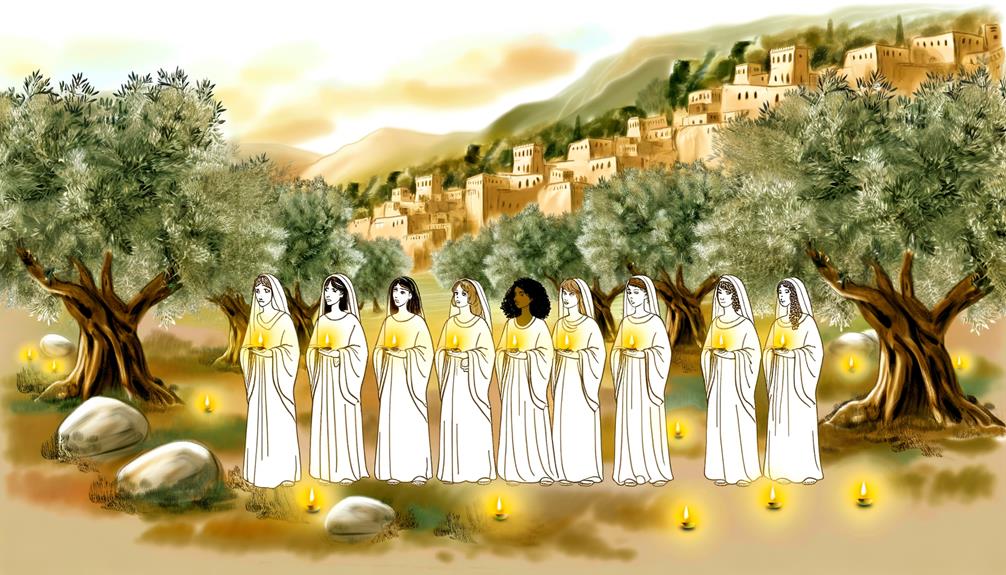10 Virgins In The Bible Meaning: Readiness for Christ
The parable of the ten virgins in Matthew 25 illustrates significant themes of spiritual preparedness and vigilance for the Kingdom of Heaven. The virgins symbolize purity, while the wise and foolish distinctions underscore the consequences of readiness versus negligence in faith.
The oil represents the essential spiritual preparedness needed for the coming of the bridegroom, who symbolizes Jesus Christ. This allegory stresses the need for continuous spiritual discipline and readiness, highlighting the importance of maintaining vigilance in one’s faith journey.
Understanding these elements reveals deeper insights into the parable’s lessons about spiritual accountability and preparedness.

10 Virgins in the Bible Meaning: Parable and Spiritual Lessons
| Aspect | Details |
|---|---|
| Parable Location | Matthew 25:1–13 |
| Main Theme | Readiness for the Second Coming of Christ |
| Characters | 5 Wise Virgins and 5 Foolish Virgins |
| Symbolism | Lamps = Faith, Oil = Spiritual preparedness |
| Outcome | Wise virgins enter the wedding; foolish ones are shut out |
| Key Message | Stay spiritually alert and prepared for Christ’s return |
Context of the Parable

Situated within the eschatological discourse of Matthew 25, the parable of the ten virgins serves as an essential teaching on the themes of preparedness and vigilance in anticipation of the Kingdom of Heaven.
Jesus, addressing his disciples, underscores the necessity of spiritual readiness by depicting a wedding scenario. The narrative aligns with Jewish matrimonial customs, where the arrival of the bridegroom is unpredictable, necessitating constant preparedness.
This parable is strategically positioned among other teachings concerning the end times, emphasizing the urgency of being spiritually alert.
Through this allegory, Jesus exhorts the faithful to maintain a state of readiness, highlighting the consequences of negligence. The emphasis is on the perpetual state of vigilance required for those awaiting the eschatological fulfillment.
Symbolism of the Virgins

The symbolism of the virgins in the biblical parable is rich with meaning, encapsulating themes of purity and readiness, wisdom and foolishness, and spiritual preparedness.
Each virgin’s actions and decisions serve as a metaphorical lens through which the virtues of vigilance and prudence are examined.
This allegory underscores the critical importance of being spiritually prepared for the coming of the bridegroom, reflecting broader theological principles within Christian eschatology.
Purity and Readiness
In biblical narratives, the virgins often embody the ideals of purity and preparedness, serving as profound symbols for spiritual vigilance and moral integrity.
This symbolism is vividly illustrated in the Parable of the Ten Virgins, where the virgins’ readiness to meet the bridegroom underscores the importance of being spiritually prepared for divine encounters.
Their purity reflects an untainted devotion to God, free from worldly distractions. This theological motif emphasizes maintaining a state of readiness and moral uprightness, underscoring the necessity of spiritual discipline.
The virgins’ preparedness with oil for their lamps signifies the readiness of the soul, highlighting the integral role of continuous faith and righteous living in the anticipation of eschatological fulfillment.
Wisdom and Foolishness
Among the myriad interpretations of the Parable of the Ten Virgins, the dichotomy of wisdom and foolishness serves as a profound allegory for spiritual discernment and moral responsibility.
The wise virgins, who brought extra oil, symbolize foresight and preparedness, embodying the virtues of prudence and vigilance.
Conversely, the foolish virgins, lacking additional oil, represent shortsightedness and negligence, highlighting the perils of imprudence and carelessness.
This parable underscores the importance of making judicious choices and maintaining spiritual readiness.
The stark contrast between the two groups serves as a compelling reminder of the consequences that arise from either wisdom or folly, urging believers to cultivate discernment and moral integrity in their spiritual journey.
Spiritual Preparedness
Illustrating the essence of spiritual preparedness, the parable of the ten virgins employs the symbolism of oil and lamps to convey the necessity of steadfast faith and readiness for unforeseen divine encounters.
The five wise virgins, who brought extra oil, represent those who are spiritually vigilant, maintaining their faith and good deeds in anticipation of Christ’s return. Conversely, the foolish virgins, who neglected to bring extra oil, symbolize the unprepared believers whose faith wanes over time.
This parable underscores the imperative of continuous spiritual maintenance, implying that faith should be nurtured consistently, not just in moments of crisis.
Fundamentally, the oil signifies the inner spiritual resources—wisdom, faith, and righteousness—needed to meet the divine bridegroom.
The Wise Virgins

The parable of the wise virgins emphasizes the essential elements of preparedness, wisdom, and spiritual readiness in anticipation of the bridegroom’s arrival.
Their foresight in bringing extra oil symbolizes a deeper understanding and proactive approach towards their faith.
This narrative underscores the importance of vigilance and sustained commitment to spiritual practices, ensuring one is always ready for divine encounters.
Prepared for the Bridegroom
In the Parable of the Ten Virgins, the wise virgins represent individuals who are spiritually prepared and vigilant, ensuring they have sufficient oil to meet the bridegroom upon his arrival. Their preparedness can be analyzed through four key aspects:
- Anticipation: The wise virgins anticipated the bridegroom’s arrival, reflecting a deep awareness and readiness.
- Provision: They equipped themselves with extra oil, symbolizing spiritual resilience and foresight.
- Vigilance: Their continuous watchfulness underscored the importance of maintaining spiritual alertness.
- Action: By actively preparing, they demonstrated a proactive approach to their faith journey.
This parable serves as an allegory for spiritual readiness, highlighting the necessity for constant vigilance and preparation in anticipation of divine encounters.
Wisdom and Foresight
Wisdom and foresight, exemplified by the wise virgins in the parable, underscore the critical importance of spiritual preparedness and proactive planning in one’s faith journey.
This narrative, found in Matthew 25:1-13, highlights the prudence of the wise virgins who brought extra oil for their lamps, anticipating the bridegroom’s delayed arrival. Their actions symbolize insightful foresight and a deep understanding of the need for readiness.
By preparing for unforeseen circumstances, they embody the virtues of vigilance and discernment. This parable serves as a poignant reminder that wisdom involves not only knowledge but also the application of that knowledge in a timely and judicious manner.
Consequently, the wise virgins teach us that foresight is integral to sustaining spiritual vitality.
Spiritual Readiness
Spiritual readiness, as demonstrated by the wise virgins, emphasizes the imperative of maintaining a state of constant preparedness and attentiveness in one’s faith journey. This parable, found in Matthew 25:1-13, provides a profound illustration of vigilance and foresight.
The wise virgins’ actions can be dissected into key elements that underscore spiritual readiness:
- Provision: They brought extra oil, symbolizing sustained spiritual resources.
- Vigilance: They stayed alert, highlighting the importance of continuous watchfulness.
- Preparation: Their readiness to meet the bridegroom exemplifies proactive faith.
- Wisdom: Their foresight in planning ahead contrasts sharply with the folly of the unprepared.
This narrative compels believers to introspect and ascertain their spiritual lamps are perpetually lit.
The Foolish Virgins

The parable of the foolish virgins in the Bible serves as a poignant reminder of the consequences of unpreparedness and lack of foresight. In Matthew 25:1-13, Jesus narrates the story of ten virgins awaiting the bridegroom.
The five foolish virgins, unlike their wise counterparts, fail to bring extra oil for their lamps. This oversight leaves them unprepared when the bridegroom arrives, ultimately causing them to miss the wedding banquet. This parable emphasizes the necessity of vigilance and preparedness.
| Aspect | Foolish Virgins | Wise Virgins |
|---|---|---|
| Preparation | Did not bring extra oil | Brought extra oil |
| Outcome | Missed the wedding banquet | Entered the wedding banquet |
| Lesson | Consequences of unpreparedness | Rewards of foresight and vigilance |
This story underscores the critical importance of readiness in spiritual and practical life.
Importance of the Oil

Integral to understanding the parable of the ten virgins is recognizing that the oil symbolizes spiritual preparedness and continuous readiness for the arrival of the bridegroom. The presence of oil in the parable conveys several key insights:
- Spiritual Vigilance: The wise virgins’ possession of oil underscores the necessity for constant spiritual alertness.
- Personal Accountability: Each virgin is responsible for her own oil, indicating personal responsibility in maintaining one’s spiritual state.
- Faith and Works: The oil can be seen as a metaphor for faith combined with righteous deeds, reflecting an active spiritual life.
- Consequences of Neglect: The absence of oil in the foolish virgins’ lamps highlights the dire consequences of spiritual negligence.
This symbolism urges believers to remain perpetually prepared for divine encounters.
The Bridegroom’s Role

Central to the parable, the bridegroom represents Jesus Christ, whose arrival signifies the culmination of divine judgment and the establishment of His kingdom. This metaphorical role underscores the eschatological themes prevalent in Christian theology, where Christ’s second coming is a pivotal event.
The bridegroom’s delayed arrival tests the preparedness and faithfulness of the virgins, symbolizing the believers. His eventual arrival marks a clear demarcation between the wise and the foolish, those who are spiritually vigilant versus those who are not.
The bridegroom’s role is therefore both a harbinger of joy for the faithful and a solemn reminder of the consequences of spiritual negligence. This dual aspect reinforces the importance of vigilance and readiness in the Christian faith.
Lessons on Readiness

Analyzing the parable of the ten virgins reveals profound insights into the necessity of spiritual readiness and constant vigilance in anticipation of Christ’s return.
The narrative underscores the importance of preparation and foresight through several key lessons:
- Vigilance: The wise virgins exemplify the need for continuous alertness and awareness.
- Preparation: Adequate preparation, symbolized by the extra oil, is essential for enduring faith.
- Accountability: Each virgin is responsible for her own state of readiness, highlighting individual responsibility.
- Consequences: The exclusion of the foolish virgins at the door teaches the irreversible consequences of neglecting spiritual duties.
These lessons collectively emphasize that readiness is not a one-time effort but a sustained spiritual discipline.
Modern Interpretations

In contemporary theological discourse, the parable of the ten virgins is often interpreted through various lenses that address modern spiritual and ethical challenges.
Scholars emphasize the importance of vigilance and preparedness, drawing parallels to contemporary issues such as moral accountability and social justice. The wise virgins, who are prepared with oil, symbolize those who actively cultivate their spiritual lives and ethical responsibilities. Conversely, the foolish virgins highlight the pitfalls of complacency and neglect.
Modern interpretations also consider the communal aspects of readiness, suggesting that collective vigilance within faith communities fosters resilience and moral integrity. Consequently, the parable serves as a multifaceted narrative, urging believers to remain watchful and proactive in both personal faith and communal obligations.
Conclusion
The Parable of the Ten Virgins serves as a profound allegory on spiritual preparedness and vigilance.
By contrasting the wise and foolish virgins, it underscores the necessity of readiness and the importance of possessing the ‘oil’ of faith and good deeds.
The bridegroom’s delayed arrival poses a critical question: Are believers prepared for Christ’s return?
Modern interpretations continue to find relevance in the parable’s timeless lessons, urging ongoing spiritual diligence and introspection.






